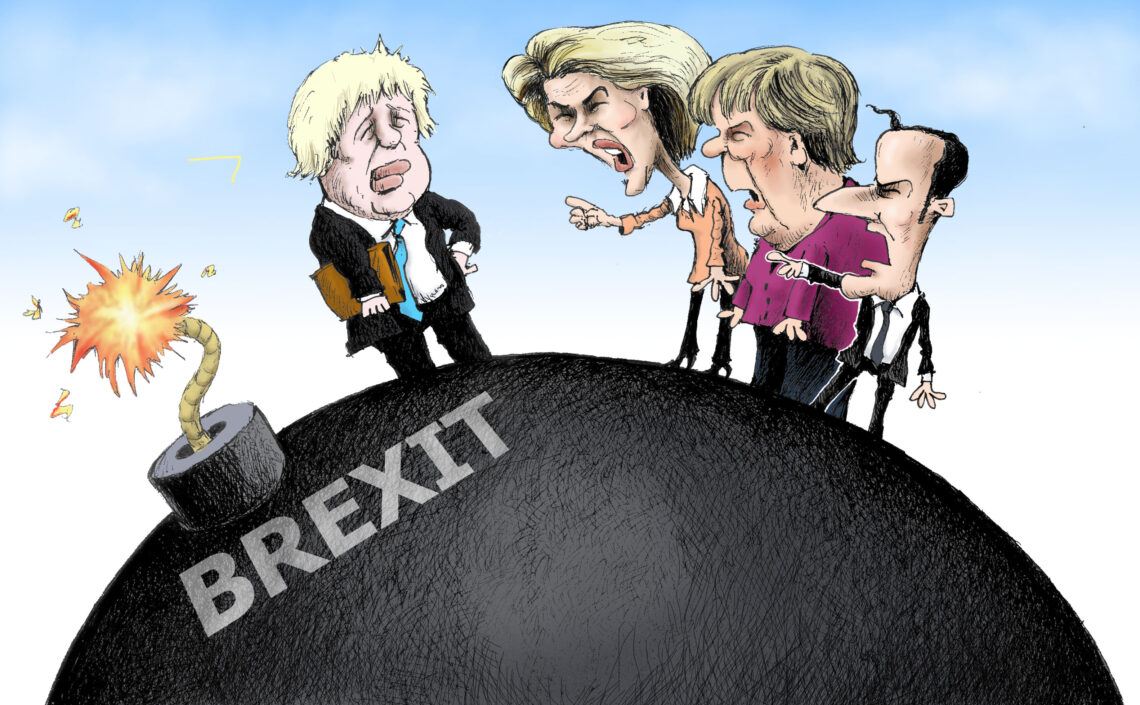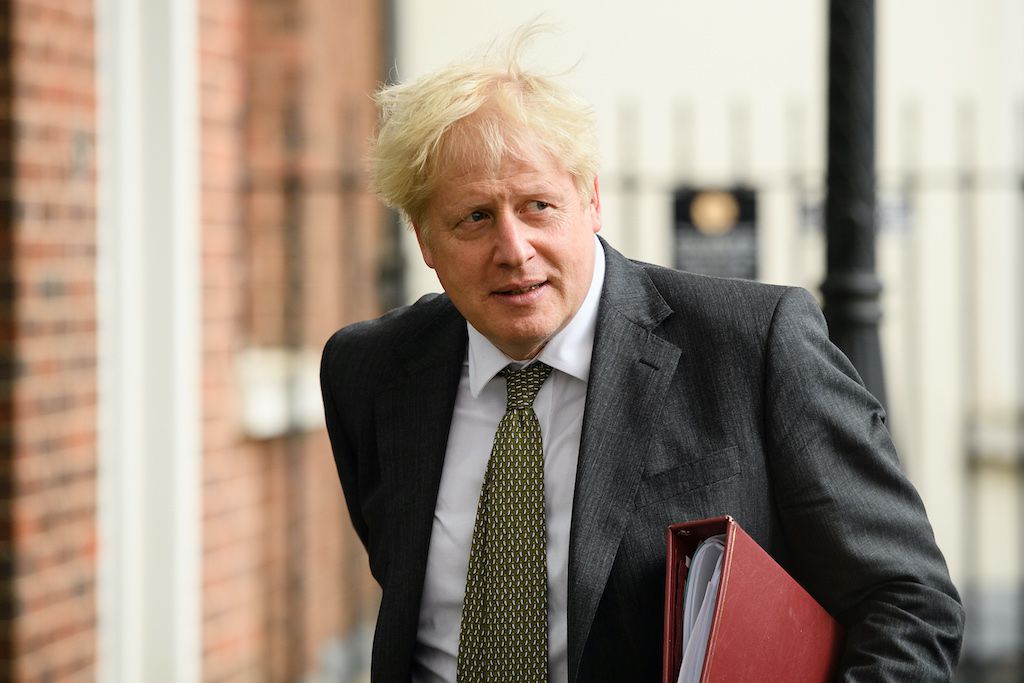Britain’s EU negotiations – perfidious Albion?
The British government’s posturing in talks with the EU is testing goodwill in European capitals. Apart from risking a no-deal Brexit on January 1, 2020, it casts a shadow over Britain’s prospects for close security and defense cooperation with Germany and France.

In a nutshell
- Britain’s prime minister is in new trouble of his own making
- Boris Johnson’s latest policy proposal violates the UK-EU separation treaty
- London’s ongoing negotiations with Brussels could still deliver a modest trade pact
“My Word is My Bond” is the motto of the London Stock Exchange and, traditionally, of the English in general. Fair dealing, trust and the rule of law have long been the basis for British influence in the world. Margaret Thatcher, the former British prime minister, declared in a 1975 speech that “Britain does not break treaties. It would be bad for Britain, bad for relations with the rest of the world, and bad for any future treaty on trade we may need to make.”
In early September, British Prime Minister Boris Johnson laid before the House of Commons an Internal Market Bill (IMB), which allowed ministers to disregard the United Kingdom’s obligations under The EU-UK Withdrawal Agreement, a duly ratified international treaty. A cabinet minister told the House of Commons that the planned measure “would break international law in a very specific and limited way.”
Ireland issue again
This provoked uproar in Brussels, shock in Ireland, the departure of the British government’s chief legal officer and dissent among British Conservatives. Scottish nationalists claimed that Edinburgh, too, could take the law into its own hands and proclaim independence. Democrats in Washington D.C. warned that the Congress would never endorse a trade agreement with the UK if London broke international law and endangered the 1998 Belfast Agreement, also known as the Good Friday Agreement, which ended the violent conflict in Ireland.
The British government invoked the implausible specter of the EU trying to impose a kind of food blockade.
The Good Friday Agreement could be put at risk if a new land border were built across Ireland in response to backtracking by the British government from its promise to allow EU regulations identical to those in the Republic of Ireland to apply in Northern Ireland. If regulations diverged in the Republic and the North, new land border controls across Ireland could be needed to check on goods in transit, undermining free movement, one of the pillars of the Good Friday Agreement.
After the UK’s post-Brexit transition period expires at the end of the year, the proposed Internal Market Bill would enable Britain unilaterally to disapply EU anti-subsidy rules and trade procedures in Northern Ireland. To justify this, the British government invoked the implausible specter of the EU trying to impose a kind of food blockade on trade between Great Britain (England, Scotland and Wales) and Northern Ireland, a hypothesis rejected by the EU’s chief negotiator.

Imperfect device
The British prime minister’s willingness to envisage actions contrary to international law is part of his search for a way out from his pledge to pursue arrangements for Northern Ireland that are mutually exclusive. He now wants to avoid both land border controls across Ireland and controls on trade between Great Britain and Northern Ireland, where some EU rules will continue to apply. Yet trade controls “in the Irish Sea” were the device that Mr. Johnson personally endorsed to get away from his predecessor’s unpopular “backstop” and thus secure British parliamentary approval for the EU Withdrawal Agreement. The prime minister has responded to criticism from Brussels, Belfast, Berlin and Dublin by postponing the final adoption of the Internal Market Bill until after the EU negotiations are concluded. This puts off a showdown but does not resolve the problem.
The IMB’s flouting of the Withdrawal Agreement induced the European Commission to begin legal proceedings against the UK. However, the ultimate juridical authority for such a charge is the European Court of Justice (ECJ). The ECJ is likely to find against the UK, and its government is likely to ignore the judgment if the matter ever comes to court.
Any United States administration will express solidarity with Ireland.
The British government’s unpredictable posturing in its negotiations with the EU is eroding goodwill in European capitals. Apart from risking a no-deal outcome on January 1, 2020, it puts into doubt the prospect of Britain cooperating closely on security and defense with Germany and France in a kind of “E-3” triumvirate after Brexit is completed.
A senior figure in Chancellor Angela Merkel’s CDU/CSU parliamentary group has spoken, with some hyperbole, of Britain drifting toward such autocratic countries as Russia, Turkey, China and North Korea. The reaction in Paris has been more muted. The French authorities will continue to favor bilateral intelligence and security cooperation with Britain, Europe’s other nuclear power and permanent Security Council member, whenever threat perceptions and interests overlap. However, Paris will not approve the formalization of the E-3 as an alternative platform for foreign policy and security cooperation with Britain outside the EU framework.
The British government’s declared willingness to break an international treaty, with the implausible excuse that it was concluded in haste, undermines its credibility as a negotiating partner with the EU and potential partners worldwide. For the British government to engage effectively in trade negotiations with the administration that takes office in Washington next January, it must clarify its future economic relations with the EU and overcome doubts about its competence and credibility. Any United States administration will express solidarity with Ireland and place American interests first. It will prove unyielding on issues, from “chlorinated chicken” to American firms’ eligibility for supply contracts from Britain’s National Health Service – which prevented Mr. Johnson from reaching a trade agreement with the present Trump administration. A Democratic administration, lacking populist solidarity with Mr. Johnson and defending American workers, could prove a formidable adversary.
Scenarios
British leaders have begun to realize that a go-it-alone posture carries costs and that compromise is necessary. In the UK-EU negotiations, there is scope for compromise by both sides on the principal outstanding issues: state aid, the EU’s demand that Britain commits to a “level playing field” in several important areas like labor law and the environment, and fisheries.
Britain and the EU face two scenarios for January 1, 2021: a limited trade agreement and a no-deal Brexit. Both would involve disrupting value chains and mounting new obstacles to trade, though these would be far worse in a no-deal scenario. EU economic interests would be harmed in either case but the British economy would be hardest hit. The UK authorities have warned logistics companies to expect queues of 7,000 trucks at the Channel Tunnel and two-day delays, whether or not an agreement is in place. The absence of port staff because of Covid-19 could add to the disruption of smooth-flowing supply chains. A senior British minister has said that France will be responsible if the strict enforcement of Schengen rules from January 1 causes additional delays.
Despite the British government’s bluster and apparent willingness to break the existing withdrawal agreement, Mr. Johnson doubtless wishes to avoid the economic and political costs of a no-deal Brexit. His government is already under intense pressure over its handling of Covid-19, education, a report on Russian interference and inadequate engagement with the “devolved administrations” in Belfast, Cardiff and Edinburgh. He knows that a contractual framework between the UK and the EU would bring clear advantages. Even a limited trade agreement would eliminate tariffs and quotas for goods and improve the chances of the EU maintaining “equivalence” status for UK financial services and data regulations. It would facilitate cooperation between customs authorities on both sides of the channel to reduce the disruption of trade flows. Above all, the successful negotiation of an EU-UK agreement would help restore mutual confidence and trust and preserve the peace in Ireland.
A modest trade pact that could be expanded under a future British government. But to achieve a breakthrough, Mr. Johnson would need to face down hardliners in his own party. He has the votes but must also find the determination. Any EU-UK agreement is likely to come through a last-minute compromise between Mr. Johnson, Chancellor Angela Merkel, the current EU Council president, and other EU leaders. This remains, narrowly, the most likely scenario but contingency planning for a less favorable outcome is indispensable.








